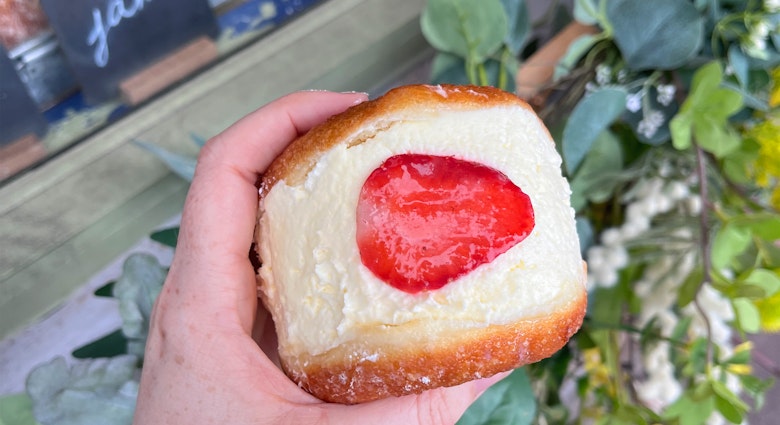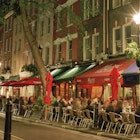
The omakase dining experience at Sake no Hana is a sushi-lover's dream
Dec 13, 2019 • 2 min read

Sake no Hana is Hakkasan’s sister restaurant in The West End. The omakase sitting is at 7:00pm each night, and there is typically one chef to two diners – perfect for a special occasion date! Charming Chef Hideki explained why each ingredient was chosen, where it came from and even gave us directions on how best to eat each delicious morsel, especially once the sake started to kick in.

What is omakase?
Omakase, meaning ‘I’ll leave it up to you’, is a traditional Japanese dining experience where your chef chooses and prepares the menu in front of you. The menu changes daily, depending on the season and what ingredients are available. Our experience at Sake no Hana was intricately artistic, incredibly delicious and endlessly interesting. We chose a small carafe of Azure, Ginjo-grade (premium) sake which had a fruity taste with a dry finish.

What was on the menu?
Aburi shimesaba: Cornish cured mackerel with turnip.
This was the Sakizuke, meaning appetiser and was similar to an amuse-bouche.
Hirame dashi: konbu and bonito broth with turbot and grated yuzu.
This was the Atsumono, meaning broth made of fish and vegetables. Top tip: Chef Hideki recommend we wafted the aroma from the broth into our faces using both hands for this dish, and you should too!

Suzuki: Hidaka konbu cured Cornish seabass.
The first of the 11 Nigiri pieces served during the meal. Chef Hideki first prepared fresh wasabi by finely grating it on a wooden board that was covered in shark skin to allow air to mix with the root, naturally.
Hamachi: Zeeland yellowtail with winter truffle.
Zuke maguro: koji-fermented Japanese tuna.
Ika: cuttlefish with Oscietra caviar.

Japanese o toro: fatty tuna topped with salty, milky caviar.
Langoustine ‘aburi’: Scottish langoustine with citrus soy sauce, miso and flying fish roe.
Chu toro: medium-fatty Japanese tuna.

Uni gunkan: fresh Icelandic sea urchin wrapped in seaweed.
Hotate: Scottish divers scallop.

Toro dog: Japanese tuna with shiso and takuwan, rolled in seaweed.
Unagi: Irish ‘ikejime’ eel, marinated in soy sauce and blow-torched.
Akadashi misoshiru: Nagoya red miso soup with Okinawa seaweed.
Otemae: This was a traditional Japanese matcha tea ceremony served with ichigo daifuku, yuzu cake and goma monaka ice cream. Chef Hideki explained that the tea must be prepared with the ‘face’ of the cup towards the server, and how the person drinking should pick up the cup and then turn it slightly to point the face away.
Make it happen
The omakase experience at Sake no Hana is £135 per person, with an optional paired sake flight for £45. To make a reservation, email [email protected] or call 02079258988.
Explore related stories




 ActivitiesPlanning an England trip in 2024? Consider these 16 top places to visit
ActivitiesPlanning an England trip in 2024? Consider these 16 top places to visitFeb 26, 2024 • 10 min read
 Tips & AdviceLocal Bites: the best places to eat and drink in London's West End
Tips & AdviceLocal Bites: the best places to eat and drink in London's West EndNov 10, 2023 • 5 min read
 Festivals & EventsTraveling to London for the royal coronation? Here's what you need to know
Festivals & EventsTraveling to London for the royal coronation? Here's what you need to knowMay 5, 2023 • 6 min read
Art and Culture12 must-see events in London this summer... including Europe's biggest street partyJul 5, 2022 • 4 min read

 HistoryBring the West End to your living room with this new streaming service from Andrew Lloyd Webber
HistoryBring the West End to your living room with this new streaming service from Andrew Lloyd WebberApr 6, 2020 • 2 min read

